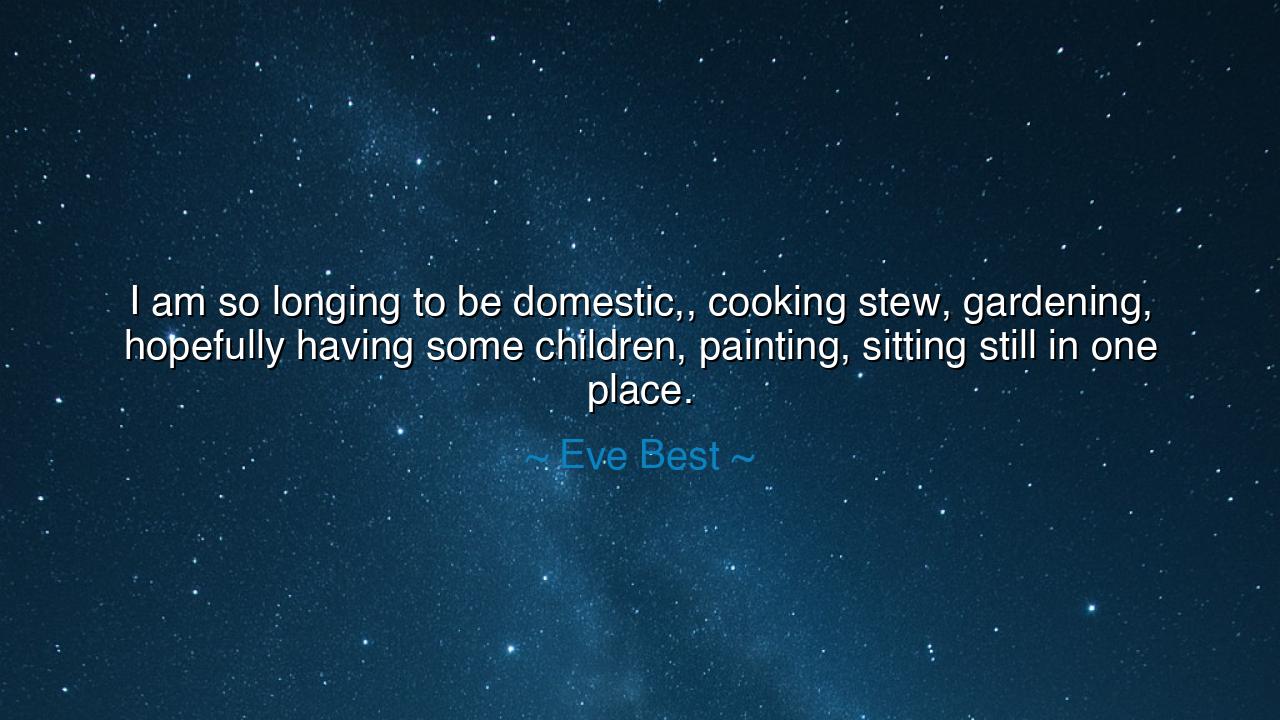
I am so longing to be domestic,, cooking stew, gardening
I am so longing to be domestic,, cooking stew, gardening, hopefully having some children, painting, sitting still in one place.






“I am so longing to be domestic, cooking stew, gardening, hopefully having some children, painting, sitting still in one place.” Thus spoke Eve Best, the actress of stage and screen, whose heart—though often carried across the restless seas of art and performance—yearned for the quiet harbor of home. In these tender words, there breathes an ancient ache, as old as humanity itself: the longing for stillness, for the rhythm of the hearth, for the sacred simplicity of tending to what is near. Hers is not merely the desire of a weary traveler, but the confession of a soul seeking wholeness—the peace that comes not from applause, but from rootedness.
The origin of this quote lies in the life of a woman whose profession called her constantly into transformation. Eve Best, a celebrated actress of Shakespearean depth, lived much of her life in motion—inhabiting other souls, other voices, other worlds. Yet within her, there remained a yearning for the one role that is not performed but lived: the domestic life. In saying she longs to “sit still in one place,” she reveals the eternal truth that even the most creative spirits, who soar on wings of imagination, eventually crave grounding—the return to ordinary joys that make the soul whole. It is the paradox of the artist and the wanderer: to live among stories, yet desire the one story that unfolds slowly, day by day, at home.
To cook stew, to garden, to paint, to sit still—these are not idle acts. They are forms of worship, ancient and elemental. In cooking, one transforms the raw gifts of the earth into nourishment; in gardening, one partners with time and patience to coax life from soil; in painting, one gives form to the unseen; and in sitting still, one allows the storm of thought to settle into peace. Together, these acts make up the sacred art of being present. In our age of motion and noise, to long for such things is not weakness—it is wisdom. It is the heart remembering what the mind forgets: that happiness is not found in striving, but in dwelling.
History, too, tells of those who, after great wandering, sought peace in domesticity. Marcus Aurelius, emperor of Rome and philosopher of stoicism, ruled the mightiest empire on earth, yet wrote in his meditations of his longing for simplicity—for the quiet life of study, family, and inner stillness. “The art of living,” he wrote, “is more like wrestling than dancing.” And when the weight of rule grew heavy, he found solace not in victory, but in the discipline of the heart. So it is with Eve Best’s longing: she has walked the grand stage of the world, but her soul yearns not for crowns or applause—it yearns for the gentle rhythm of domestic life, where meaning is grown, not chased.
This longing also speaks to the deeper human condition. We live in an age that celebrates restlessness—achievement, movement, constant reinvention. Yet within every heart lies the desire to belong—to have a place where love can take root and peace can endure. The stew that simmers on the stove, the flowers that bloom in the garden, the laughter of children—all these are symbols of life’s truest wealth. The domestic world is not a retreat from life—it is the foundation of it. It is where the spirit learns constancy, where beauty is renewed in daily acts of care.
There is also a quiet heroism in her words. To “sit still in one place” in a world of endless distraction requires courage. It demands that one face oneself without disguise or performance. The garden and the kitchen are classrooms of humility; the stew will burn if neglected, the flower will die if overwatered. These simple acts teach the soul patience, balance, and gratitude. In such work, there is no audience—only truth. It is a return to the elemental: the earth beneath one’s hands, the scent of herbs and bread, the slow rhythm of the day unfolding as it was meant to.
Therefore, my child, take this lesson from Eve Best’s yearning: do not despise the simple life. The grandeur of the world cannot replace the sanctity of home. Seek not always to wander, but to dwell; not always to achieve, but to nurture. Make time for the domestic arts—cook, plant, paint, and learn to be content in stillness. For it is in these small, steady acts that the great work of the soul is done.
And remember: the world may applaud the conqueror, but heaven smiles upon the one who tends. Let your heart, like Eve’s, find peace not in performance, but in presence. For the true garden is not only the one outside the window—it is the one within, where patience, gratitude, and love grow quietly, day by day, in the sunlight of stillness.






AAdministratorAdministrator
Welcome, honored guests. Please leave a comment, we will respond soon